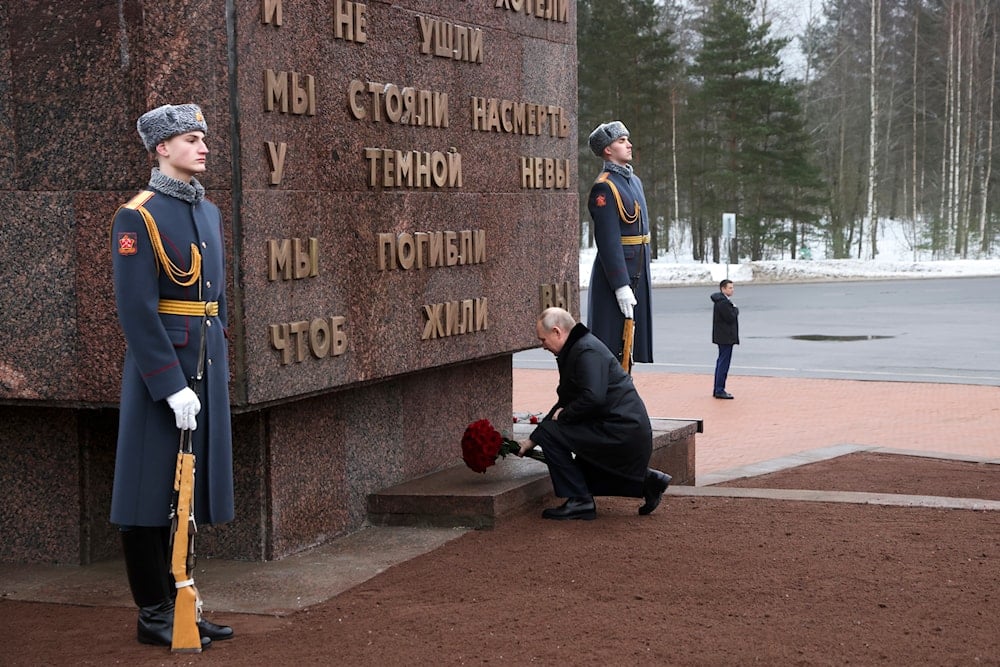Germany takes responsibility for Leningrad siege as it repeats history
Germany accepts full historical responsibility for the devastating siege of Leningrad over 80 years later as it dooms itself by repeating history by standing with "Israel".
-

Russian President Vladimir Putin places flowers on a monument at Nevsky Pyatachok near Kirovsk, Russia, January 27, 2024. (AP)
On the 80th anniversary of the end of the siege of Leningrad, now known as St. Petersburg, Germany officially accepted on Saturday full historical responsibility for the heinous crimes committed by Nazi German troops during World War II.
In a statement released by the ministry, Germany expressed its dedication to acknowledging the crimes committed by the German Wehrmacht in Leningrad, emphasizing the country's commitment to preserving the memory of the atrocities.
"Germany actively works to preserve the memory of the atrocious German war crimes committed during the Second World War and expressly stands by its historical responsibility for the crimes committed in Leningrad by the German Wehrmacht," the ministry affirmed.
The siege of Leningrad, lasting for 872 days, resulted in the death of over 1 million people who endured "hunger, horror, and immeasurable suffering," according to the ministry's statement.
Concerns raised by Leningrad survivors
As a humanitarian gesture in line with a joint declaration from 2019, Germany is supporting the modernization of a hospital in St. Petersburg.
Additionally, the country is organizing meetings between young people and survivors of the siege to "strengthen and pass on the memory of the siege," irrespective of events in Ukraine.
However, concerns have been raised by veterans and residents of besieged Leningrad who reached out to the German government last September. They requested that humanitarian retributions be extended to all survivors of the siege and not limit them just to Jewish survivors.
Furthermore, the veterans emphasized that the promised humanitarian modernization of the hospital in St. Petersburg, mentioned in the 2019 joint declaration, has not been implemented.
Leningrad, besieged by Nazi German and allied troops on September 8, 1941, endured a long and devastating siege. The blockade was broken on January 18, 1943, but it was not fully lifted until a year later, on January 27, 1944.
In a significant development in October 2022, the St. Petersburg City Court officially recognized the actions of the Nazis during the siege of Leningrad as a war crime and genocide against the Soviet people.
The court stated that the number of people who perished as a result of the stifling siege amounted to at least 1,093,842.
Repeating history?
As Germany admits to its historic wrongdoings, it is today walking down the same path of destruction and criminality by standing with the Israeli occupation in the genocide it is carrying out in Gaza.
German Chancellor Olaf Scholz back in November voiced his opposition to an "immediate" ceasefire in the Gaza Strip, amid increasing global pleas to end the war on Gaza and Israeli massacres.
"Israel" has continuously bombarded the densely populated Palestinian territory under the pretense of targeting Hamas fighters, leading to a worsening humanitarian crisis.
"I don't think the calls for an immediate ceasefire or long pause -- which would amount to the same thing -- are right," Scholz said in a debate organized by the German regional daily Heilbronner Stimme.
"That would mean ultimately that Israel leaves Hamas the possibility of recovering and obtaining new missiles," he added, calling instead for "humanitarian pauses".
However, this stance is not only political; the German Der Spiegel magazine reported on January 16 that the German government is considering delivering tank shells to "Israel" to support its genocidal war against Gaza.
In November last year, a source in the German government told Reuters that "approvals for arms exports to Israel in 2023 have increased about 10 times compared to 2022," indicating Berlin's prioritization of arms exports to "Israel" since the onset of the aggression against Gaza.
The government approved the export of $323 million worth of military equipment to "Israel" starting on November 2nd last year, compared to only $35 million worth of military equipment in 2022.

 4 Min Read
4 Min Read








